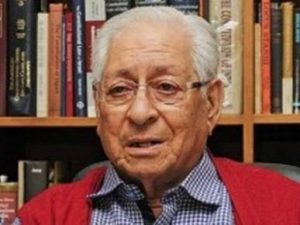New Delhi, Delhi, India:
Jindal School of Government and Public Policy (JSGP) launched a new B.A. Honours in Economics programme amidst a galaxy of academicians, economists and policy makers.
The inaugural session was followed by a daylong seminar on the theme “Discipline of Economics: Responding to Peoples Aspirations and Policy Challenges” devoted to exploring paradigms and possibilities for a new pedagogy for economics at the undergraduate level.
Delivering the keynote address, Dr. Amitabh Kundu, Senior Fellow, Delhi Policy Group and former Dean, School of Social Sciences, Jawaharlal Nehru University, said, “The crash of Lehmann Brothers that snowballed into a major global crisis challenged the fundamental paradigm and ideological framework of economic theory.” Prof. Kundu welcomed the effort to devise a new curriculum for teaching economics with a greater awareness of economic history, better understanding of the real world, social context, more capacity to communicate with people from other disciplines, administrators, policy makers accompanied with using more simple models with transparent and verifiable assumptions.
The Vice-Chancellor of Jindal Global University, Professor (Dr.) C. Raj Kumar reflected on the question of why we need a new kind of undergraduate programme in economics at JSGP: “The launch of this programme marks an important milestone in the journey of the university in which we take our undergraduate programmes very seriously. We strongly believe that undergraduate is the place where some of the most significant and fundamental aspects of any discipline and knowledge are inculcated amongst the youth. We are conscious of the fact that there are far too many undergraduate programmes in India and the quality and ability of these programmes to fulfill the aspirations of the young people is, unfortunately, limited. The effort of Jindal Global University is to challenge and resist the status quo.”
Dean and Professor R. Sudarshan emphasized that Economics is a long established discipline whose basic contents are well entrenched. But it is also necessary to bring freshness to the learning and teaching of economics. Dean Sudarshan pointed out that changing the curriculum in any discipline must confront challenges of habits and inertia. Jindal Global University, being new, nimble, adaptable in shaping its courses and curricula is well placed to be in tune with changing needs.
Speaking on making economics relevant for people Prof. Rajeev Malhotra in the JSGP faculty, an eminent applied economist, who has authored a pioneering India Public Policy Report, which contextualizes policy making through analytical and empirical lenses, said, “there is need to look at this theme at two levels, firstly how the discipline needs to evolve as a taught discipline and then how it has to respond to the needs of practice and how it has to be applied. The distinction really revolves around the need to look at the subject in an orthodox tradition manner vis-à-vis the more heterodox approach. The orthodox teaching of economics cannot be undermined and the heterodox emerges from the application of the orthodox. It is important for us to question where we would draw the lines if we were to design a truly heterodox curriculum at the UG level.”
Dr. Rathin Roy, Director, National Institute of Public Finance and Policy, while speaking about the design of an ideal undergraduate programme in economics observed: “ There are three things that matter: one we have to understand that economics does not have the word ‘people’ in it. Economics talks of agents and we must explain what these agents are. Secondly, we must pay attention to the state because economics lacks theorizing on the state and this is a limitation all undergraduates need to understand. Lastly, economics is not a science, but it is about passion and reason. Like lawyers, you have to argue your case.”
Dr. Thomas Richardson, Senior Resident Representative, International Monetary Fund, New Delhi questioned, “Do we do economics for economists, are we inward looking?” He spoke of the terrific opportunity that the young have to question orthodoxy and learn economics fit for its purposes, new and old.
Dr. Shekhar Shah, Director, National Council for Applied Economic Research, New Delhi, while speaking about the discipline of economics and how it should be taught said, “economics to me is the most exciting fields and if teachers of economics delve into why we behave the way we do and why things happen the way they do and if students of economics demand that, there is no chance of economics becoming a boring subject.”
Dr. Rajat Kathuria, Director and Chief Executive, Indian Council for Research on International Economic Relations while speaking on growth and development said, “The new thinking on growth and development is that it is possible for them to co-exist. The mainstreaming of climate economics with development in economic policy is happening now much more than it did in the past.”
He further noted that behavioural economics is becoming important for policy makers, “PM Modi is using behavioural economics when he called up well-off customers to sacrifice their gas subsidy entitlement voluntarily. This is an attempt at moulding behaviour. Economics today is pushing boundaries in an inter-disciplinary world.”
Mr. Dhiraj Nayyar, Officer on Special Duty, NITI Aayog spoke of economic transformation being centered around industrialization in the country and said, “With this government there is a new thrust on ‘Make in India’ and reviving manufacturing in the country. Economic transformation fundamentally requires moving away from control, regulation and a state-led mind set to one which is based on competition, choices and focuses more on the individual.”
Dr. Shubhashis Gangopadhyay, Research Director, India Development Foundation and Professor, University of Gothenburg, addressing future economists said: “Whenever we think of economics we think unemployment, inflation, growth rate, but this is really not economics. The conflict between individual welfare maximization and aggregate welfare maximization is the dilemma that economists must try to solve at all times.”
Prof. Chander, who is also a fellow of the Econometric Society, spoke about the necessity of developing a strong quantitative toolkit in order to make sound economic policy judgements. With a comprehensive skill set, which the new B. A. Economics Honours curriculum intends to impart, students will be not only ready to pursue a career as professional economists in industry, government, or management consultancy, but also in other financial occupations and managerial occupations.
The seminar concluded with a lecture by Professor (Dr.) Deepak Nayyar, Emeritus Professor of Economics, Jawaharlal Nehru University and former Vice-Chancellor, University of Delhi. He spoke about his new book “Catch Up: Developing Countries in the World Economy”. Dr. Nayyar said, the object of his book is to analyze the evolution of developing countries in the world economy, situated in a long-term historical perspective, from the onset of the second millennium, but with a focus on the second half of the twentieth century and the first decade of the twenty-first century.” This talk underlined why a new generation of economists should have a solid grounding in economic history and evolution of economic thought.



